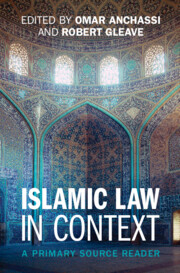Book contents
- Islamic Law in Context
- Islamic Law in Context
- Copyright page
- Contents
- Acknowledgements
- Contributors
- Introduction
- Part I Islamic Legal Theory (Uṣūl al-Fiqh) and Related Genres
- Part II Islamic Jurisprudence (Fiqh) and Related Genres
- Part III Legal Opinions (Fatwās)
- Part IV Court Judgments and Other Court Documentation
- Chapter 24 Introduction to Part IV
- Chapter 25 The Restitution of Conjugal Rights
- Chapter 26 A Sharīʿa Court Judgment of Muḥammad Ḥusayn Fishārakī (d. 1353/1935) Reviving the Safavid Waqf of Mīrzā Aḥmad Kafrānī (d. after 988/1580)
- Chapter 27 Authenticating Marriage
- Chapter 28 Judgment of the Moroccan Supreme Council of Sharīʿa Appeals, Ruling No. 52 on Issue No. 4164 concerning Inheritance, Slavery and Paternity (1359/1943)
- Chapter 29 Sharīʿa, Sales and Loans in the Malaysian High Court
- Chapter 30 A Sharīʿa Court Decision on the Type of ‘Compensation’ in Huləʾə/Khulʿ Divorce
- Part V Judicial Manuals and Reference Books
- Part VI Alternative Sources for Islamic Legal Studies
- Name Index
- Subject Index
- References
Chapter 29 - Sharīʿa, Sales and Loans in the Malaysian High Court
Affin Bank Bhd v. Zulkifli bin Abdullah on Islamic Home Financing (2005)
from Part IV - Court Judgments and Other Court Documentation
Published online by Cambridge University Press: 14 November 2024
- Islamic Law in Context
- Islamic Law in Context
- Copyright page
- Contents
- Acknowledgements
- Contributors
- Introduction
- Part I Islamic Legal Theory (Uṣūl al-Fiqh) and Related Genres
- Part II Islamic Jurisprudence (Fiqh) and Related Genres
- Part III Legal Opinions (Fatwās)
- Part IV Court Judgments and Other Court Documentation
- Chapter 24 Introduction to Part IV
- Chapter 25 The Restitution of Conjugal Rights
- Chapter 26 A Sharīʿa Court Judgment of Muḥammad Ḥusayn Fishārakī (d. 1353/1935) Reviving the Safavid Waqf of Mīrzā Aḥmad Kafrānī (d. after 988/1580)
- Chapter 27 Authenticating Marriage
- Chapter 28 Judgment of the Moroccan Supreme Council of Sharīʿa Appeals, Ruling No. 52 on Issue No. 4164 concerning Inheritance, Slavery and Paternity (1359/1943)
- Chapter 29 Sharīʿa, Sales and Loans in the Malaysian High Court
- Chapter 30 A Sharīʿa Court Decision on the Type of ‘Compensation’ in Huləʾə/Khulʿ Divorce
- Part V Judicial Manuals and Reference Books
- Part VI Alternative Sources for Islamic Legal Studies
- Name Index
- Subject Index
- References
Summary
This chapter concerns a 2005 Malaysian court case in which the plaintiff defaulted on home-purchasing loan and then claimed he could obtain favourable repayment terms if he switched his borrower from Affin (Islamic) Bank to a regular commercial bank. According to the local regulatory framework, all commercial transactions, including those of Islamic banks, fall under the jurisdiction of the civil courts. The government issued a specific law - namely the Islamic Banking Act 1983, later enhanced as the Islamic Financial Services Act 2013 - to regulate the Islamic banking and financial industry. As Malaysia practises a dual banking system, whereby Islamic banking products are offered side by side with the conventional ones, the case presents interesting comparison between the two banking products.
- Type
- Chapter
- Information
- Islamic Law in ContextA Primary Source Reader, pp. 311 - 320Publisher: Cambridge University PressPrint publication year: 2024

